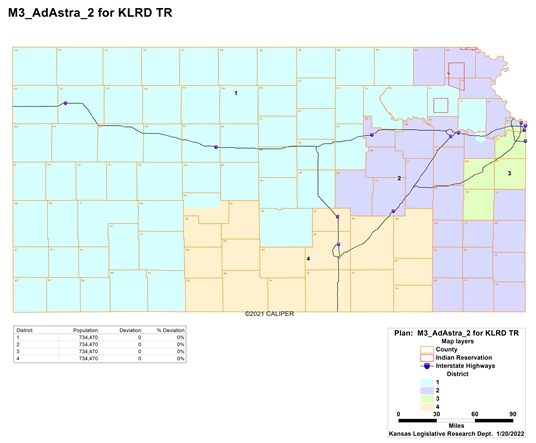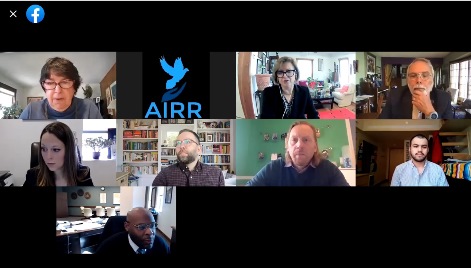Appeal to the Supreme Court expected regardless of outcome
by Noah Taborda, Kansas Reflector

Topeka — An attorney representing Kansas voters who feel their votes will be drowned out by new congressional districts wrapped a weeklong trial Monday by urging a district judge to block the map on grounds the GOP-dominated Legislature tore apart communities of interest for political benefit.
The proposal splits the Kansas City metro area along Interstate 70, separating the northern part of Wyandotte County, an area with a heavy Democratic lean, from Johnson County and the 3rd District. It also places Lawrence into the 1st District, which extends west to the Colorado border, about 400 miles from the college town.
Local and D.C. voting rights attorneys asked Wyandotte County District Judge Bill Klapper to block the map known as Ad Astra 2, arguing Republican legislators intentionally engaged in a radical partisan and racial gerrymander. The assertions made by plaintiffs are at odds with the beliefs of state-hired attorneys certain the Legislature did its best to meet a complicated challenge.
Sharon Brett, legal director of the American Civil Liberties Union of Kansas, reiterated points made in opening arguments and throughout the case, tracing the map back to comments made by former Senate President Susan Wagle in September 2020, when Wagle outlined how Republicans could redraw maps to ensure four Republican representatives are sent to Congress.
Brett said the intention was always to maximize partisan gains and drown out Kansans’ voices.
“The Legislature cannot have unfettered, unchecked power to silence the political voices of those with whom it does not agree,” Brett said. “Diluted votes are not equal votes.”
The trial is being held in state court after a 2019 U.S. Court decision determined federal courts should have no say in the topic. Klapper could have until April 25 to pass a judgment.
The judge’s ruling is expected to be appealed regardless of the decision.
“I hope your case has a smooth journey through the Supremes,” Klapper said.
Even with the likelihood that this ruling would not be final, Tony Rupp, an attorney representing the state, hoped Klapper would reach a favorable judgment for the state. Rupp said even expert witnesses brought in by plaintiffs show Rep. Sharice Davids, the only Democrat from Kansas in Congress, would still be in a competitive district, and therefore the map does not reach the threshold for gerrymandering.
Rupp said if the intention were to dilute the vote of Kansas Democrats, the Legislature could have gone about it much more efficiently. A gerrymander requires the breaking of minority communities to the point candidates are unable to win, he said.
“It is a slightly more Republican than it was, but that’s not a gerrymander or, in any case, impermissible,” Rupp said. “This has created a map where either side can win based on the quality of candidates.”
Turning to concerns about the damage done to communities of interest, Rupp said the qualifications for such a community were squishy and cannot be measured. He said that even if there were an effective way to measure them, the guidelines for redistricting are merely suggestions that do not trump legislative judgment.
If Kansans feel their community was unfairly split, they can always vote out the legislators representing them, Rupp said.
But Curtis Woods, an attorney for Douglas County plaintiffs, said one only had to apply the eye test to see the length Republicans were willing to go to entrench their power. Woods also noted testimony from Douglas County Commissioner Shannon Portillo explaining how Lawrence was, with the county, a community of interest.
Scooping Lawrence into the 1st District would not only swallow up the voices of Lawrence Democrats but pushes the district beyond the required population, Woods said. He said the Big 1st, as the district is commonly referred to, only needed approximately 34,000 more people, but the map added more than 130,000 people to the district, requiring population redistribution in other rural areas.
Lawrence itself has a population of 94,000, he said.
“In other words, if you leave Lawrence out, that’s 36,000, sufficient to balance out the (congressional districts),” Woods said. “That was not their goal. Those machinations of moving 135,000 out shows you the intent of Republicans to take the Democratic votes of Lawrence and throw them into the ocean.”
Kansas Reflector stories, www.kansasreflector.com, may be republished online or in print under Creative Commons license CC BY-NC-ND 4.0.
See more at https://kansasreflector.com/2022/04/11/conflicting-sides-make-final-case-in-kansas-congressional-redistricting-trial-await-judge-decision/.

